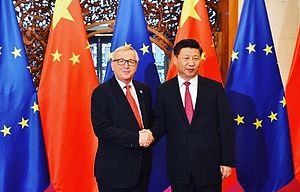Although there has been much talk of the U.S. “pivot to Asia,” the European Union (EU) has also been increasing its relations with Asia in recent years. The Diplomat’s Shannon Tiezzi spoke with Fraser Cameron, Director of the EU-Asia Center, about the reasons for the EU pivot and the future of EU engagement with Asia states.
The Diplomat: Why has the EU decided to focus more on Asia?
Cameron: The EU decision has to do with the steady rise of Asia as a source of global growth. Asia is the EU’s biggest trading partner (just ahead of the U.S.), represents one-third of the global economy and 45 percent of the world’s growth. China alone contributes 35 percent of global growth and 11 percent of global trade. Second, the EU recognizes that there are few global problems such as proliferation, disease, climate change, or terrorism, that can be resolved without Asian involvement.
So how does the EU actually engage in Asia?
The EU operates on three levels. First, the EU is a prominent member of ASEM, the biannual meeting that brings European and Asian leaders together to discuss global concerns. The most recent summit was in Mongolia in September 2016 and the next summit is scheduled for Brussels in 2018. Second, the EU supports regional groupings such as ASEAN [the Association for Southeast Asian Nations] and SAARC [South Asia Association for Regional Cooperation]. The EU is by far the biggest contributor of financial and technical assistance to ASEAN. And third, via bilateral relations with the focus on the EU’s four strategic partners – China, Japan, India, and Korea.
What sort of trade agreements does the EU have in Asia?
The EU hopes that as the ASEAN Economic Community develops there will be a bloc-to-bloc deal. But in the meantime the focus is on bilateral trade deals. The EU has concluded ambitious trade deals with Singapore and Vietnam and is currently negotiating with Indonesia, the Philippines, Malaysia, and Thailand – although this latter one is frozen as a result of the military takeover.
The EU has concluded an FTA with Korea (similar to that of the United States) and hopes to conclude a deal with Japan in the near future. The probable death of TPP [the Trans-Pacific Partnership] means that Japan is now keener to conclude the deal with the EU. Negotiations with India are proving tougher due to the difficulty of opening the service sector. As regards China, the priority is a bilateral investment agreement (again, similar to what the United States is trying to do). But these negotiations have not advanced much in the past year. The EU is pressing China to ensure a level playing field for European companies in China, many of which are facing increasing obstacles and red tape.
What about cooperation in security and other areas?
The EU is not a military actor like the United States, but it is a valuable partner for non-military actions. It helped broker peace deals in Aceh and Mindanao. It supports peace and reconciliation efforts on Northeast Asia through the NAPCI [Northeast Asia Peace and Cooperation Initiative] process. It leads the anti-piracy operation in the Gulf of Aden with the participation of several Asian countries. It runs high-level seminars on maritime security for ASEAN. It provides the lion’s share of funding for reconstruction in Myanmar and Afghanistan. It supports UN sanctions against the DPRK. And more broadly it promotes a rules-based international system which is of huge importance for global security. So no aircraft carriers in the South China Sea but a large investment in non traditional security fields.
What are the prospects of EU-US cooperation in Asia under President Trump?
It is no secret that most Europeans would have preferred a Clinton victory as she had already agreed to deepen transatlantic cooperation in Asia. With Trump there are too many unknowns. Will he maintain the pivot to Asia? Will he continue the mix of cooperation and containment of China? Will he maintain the alliance structure in Northeast Asia? Will he continue to support ASEAN? How will he approach human rights? The answers to these questions will give us an indication of how and where Brussels and Washington can work together in Asia.

































